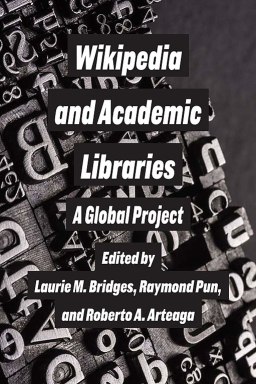By Laurie Bridges, Instruction and Outreach Librarian at Oregon State University; Raymond Pun, Education and Outreach Manager at Hoover Institution Library & Archives; Roberto A. Arteaga, Instruction and Reference Librarian at Pacific Lutheran University
In fall of 2019 we set out to publish an open access edited volume titled Wikipedia and Academic Libraries: A Global Project. Two years later that volume was published by Maize Books, an imprint of Michigan Publishing. The online edition became available on September 15, 2021 and the print edition began shipping in October 11. In the week following online publication, Wikimedians quickly uploaded the book to Wikisource and created structured data in Wikidata. With over 1,700 views and downloads since the book’s launch, it became clear that many readers around the world were excited to explore, recreate, or design projects centering Wikipedia, as a multifaceted resource, for academic engagement in their libraries. In this blog post, we share our rationale to collaborate on creating this edited book in this topic and its journey to fruition.
Throughout this two-year process…people have asked us via email, Twitter, and on Zoom, “Why a book?”
Throughout this two-year process and during COVID-19, from initial idea to publication, people have asked us via email, Twitter, and on Zoom, “Why a book?” Edited volumes have long been a popular form of scholarly publication within the social sciences and humanities (Webster, Thomson, & Carrigan, 2013; Webster, 2020). A 2018 survey of humanities scholars in the UK, US, Canada, and Europe, revealed that a third of scholars believed authoring book chapters was an essential part of scholarship (Webster, 2020). Edited volumes bring numerous authors and voices together in a community focused on a shared topic. When a reader picks up an edited volume to read a book chapter they are likely to find other book chapters within the same volume that interest them. However, despite the popularity and continued publication of edited volumes, there is trepidation within higher education about publishing chapters in edited volumes (Webster, 2020). Primary among faculty concerns is that their work will be more widely read and cited if it were published in a journal (Webster, 2020). This belief is grounded in legacy practices, publication formats, and impact metrics: journal articles routinely supply abstracts and keywords for library catalogs, while book chapters usually provide only a chapter title and author; nearly every recently published journal article has a digital object identifier (doi), while book chapters rarely have a doi; print volumes can be cost prohibitive for the end user; only journals are given an impact factor by Clarivate; the journal review process is clearly explained on the journal’s homepage while edited books often lack information about their review process. In our edited volume, we attempted to address all these concerns by publishing the book under an CC BY 4.0 license, meaning that it’s free online; the print volume will be inexpensive, because we paid the publishing fees up-front with Maize books; each chapter has a doi; the peer review process is detailed in the front-matter; and Google Scholar has taken away some of the stranglehold that Clarivate has on impact factor by tracking citations for books and book chapters (not just journal articles).
This book contains 20 chapters (including a bookend chapter that details the two-year process) by 52 authors or co-authors from Brazil, Canada, Hong Kong, Ireland, Kyrgyzstan, Mexico, Netherlands, Nigeria, Scotland, Spain, and the United States. Our authors are both new and longtime members of the Wikimedia community, representing a range of experiences and perspectives. In this book, chapters are clustered into four sections: Practical Applications in the Classroom, Practical Applications Outside the Classroom, Wikipedians-in-Residence; and Wikipedia Sister Projects.
It is our hope that this edited volume will continue to energize conversations about how library workers can engage with the Wikimedia Movement.
It is our hope that this edited volume will continue to energize conversations about how library workers can engage with the Wikimedia Movement. In addition, we hope this volume will inspire and spark future edited volumes and publications about Wikimedia-related topics within librarianship globally.
References
Webster, P., Thomson, P., & Carrigan, M. (2013, July 23). Edited collections may still have much to offer academics in the humanities and social sciences. LSE. https://blogs.lse.ac.uk/impactofsocialsciences/2013/07/23/in-defence-of-edited-collections/
Webster, P. (2020). The Edited Collection. Pasts, Present and Futures. Cambridge University Press.

Can you help us translate this article?
In order for this article to reach as many people as possible we would like your help. Can you translate this article to get the message out?
Start translation
